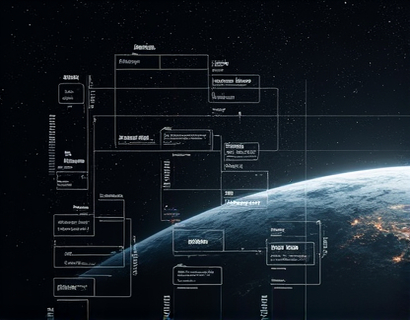Unlocking the Economic Power of Modern Ecosystems: Insights for Navigating Market Success
In today's rapidly evolving economic landscape, the concept of ecosystems has emerged as a pivotal framework for understanding market dynamics. Modern ecosystems encompass a network of interconnected entities, including businesses, consumers, and various stakeholders, all contributing to a shared economic environment. This article delves into the economic potential of these ecosystems, offering strategic insights and detailed analysis to help professionals identify and capitalize on emerging market opportunities.
The Rise of Modern Ecosystems
The term "ecosystem" has transcended its biological roots to describe complex networks in the business world. Modern ecosystems are characterized by collaboration, innovation, and interdependence. They enable organizations to leverage shared resources, knowledge, and capabilities, fostering an environment conducive to growth and success. As globalization and technological advancements continue to reshape industries, understanding the dynamics of these ecosystems becomes essential for economists, business leaders, investors, and industry experts.
Understanding Economic Ecosystems
Economic ecosystems consist of various components, including businesses, consumers, suppliers, and regulatory bodies. Each entity plays a crucial role in the overall functioning of the ecosystem. By analyzing these components, professionals can gain insights into market trends, consumer behavior, and competitive dynamics. This understanding is vital for making informed decisions and developing effective strategies.
Key Components of Economic Ecosystems
- Businesses: Companies of all sizes contribute to the ecosystem by providing goods and services. Their interactions with other entities shape market dynamics.
- Consumers: The preferences and behaviors of consumers drive demand, influencing how businesses operate and innovate.
- Suppliers: Suppliers provide the necessary resources for businesses to function, creating a symbiotic relationship within the ecosystem.
- Regulatory Bodies: Government regulations and policies impact the ecosystem's structure and functioning, affecting how businesses operate.
Identifying Emerging Market Opportunities
To unlock the economic potential of modern ecosystems, professionals must be adept at identifying emerging market opportunities. This requires a keen understanding of market trends, consumer needs, and technological advancements. Here are some strategies to help navigate this process:
1. Conduct Market Research
Thorough market research is essential for identifying opportunities within an ecosystem. This involves analyzing industry trends, consumer preferences, and competitive landscapes. By gathering data and insights, professionals can make informed decisions about where to focus their efforts.
2. Leverage Technology
Technology plays a crucial role in modern ecosystems, enabling businesses to innovate and adapt to changing market conditions. By leveraging digital tools and platforms, organizations can enhance their operations, improve customer engagement, and streamline processes.
3. Foster Collaboration
Collaboration is a cornerstone of successful ecosystems. By partnering with other businesses, organizations can share resources, knowledge, and expertise. This collaborative approach can lead to innovative solutions and new market opportunities.
4. Stay Informed About Regulatory Changes
Regulatory changes can significantly impact the functioning of economic ecosystems. Staying informed about relevant policies and regulations allows professionals to anticipate challenges and adapt their strategies accordingly.
Strategic Insights for Business Leaders
Business leaders play a critical role in navigating the complexities of modern ecosystems. Here are some strategic insights to help them succeed:
1. Embrace Agility
In a dynamic economic landscape, agility is essential. Businesses must be willing to adapt their strategies and operations in response to changing market conditions. This flexibility allows organizations to seize opportunities and mitigate risks.
2. Invest in Innovation
Innovation is a key driver of success within ecosystems. By investing in research and development, businesses can create new products and services that meet evolving consumer needs. This commitment to innovation can differentiate organizations from their competitors.
3. Build Strong Relationships
Building strong relationships with stakeholders is vital for success in modern ecosystems. By fostering trust and collaboration, businesses can create a supportive network that enhances their ability to navigate challenges and capitalize on opportunities.
4. Focus on Sustainability
Sustainability is becoming increasingly important in today's economic landscape. Businesses that prioritize sustainable practices not only contribute to environmental well-being but also appeal to a growing segment of environmentally conscious consumers.
The Role of Investors in Economic Ecosystems
Investors play a crucial role in shaping the dynamics of economic ecosystems. Their decisions influence which businesses thrive and which struggle to survive. Here are some insights for investors looking to navigate these ecosystems:
1. Analyze Ecosystem Health
Before investing, it's essential to assess the overall health of the ecosystem. This includes evaluating the relationships between businesses, consumers, and other stakeholders. A healthy ecosystem is characterized by collaboration, innovation, and resilience.
2. Identify Disruptive Innovations
Investors should keep an eye out for disruptive innovations that have the potential to reshape industries. By identifying these trends early, investors can position themselves to capitalize on emerging opportunities.
3. Diversify Investments
Diversification is a key strategy for managing risk in economic ecosystems. By investing in a variety of businesses across different sectors, investors can mitigate the impact of market fluctuations and enhance their overall portfolio performance.
4. Engage with Industry Experts
Engaging with industry experts and thought leaders can provide valuable insights into market trends and emerging opportunities. By staying informed and connected, investors can make more informed decisions.
Economic Insights for Industry Professionals
Industry professionals play a vital role in understanding and navigating economic ecosystems. Here are some insights to help them succeed:
1. Stay Current with Trends
Staying current with industry trends is essential for professionals looking to navigate economic ecosystems. This includes following news, attending conferences, and participating in industry forums.
2. Develop Analytical Skills
Strong analytical skills are crucial for understanding market dynamics and making informed decisions. Professionals should invest in developing their analytical capabilities to enhance their effectiveness in navigating ecosystems.
3. Network with Peers
Networking with peers and industry colleagues can provide valuable insights and opportunities for collaboration. Building a strong professional network can enhance an individual's ability to navigate the complexities of economic ecosystems.
4. Embrace Lifelong Learning
The economic landscape is constantly evolving, and professionals must be committed to lifelong learning. By continuously updating their knowledge and skills, individuals can remain competitive and informed in their respective fields.
Conclusion
Unlocking the economic power of modern ecosystems requires a comprehensive understanding of their dynamics and the ability to identify and capitalize on emerging market opportunities. By leveraging strategic insights and fostering collaboration, professionals can navigate the complexities of these ecosystems and achieve market success. As the economic landscape continues to evolve, staying informed and adaptable will be essential for economists, business leaders, investors, and industry experts alike.










































